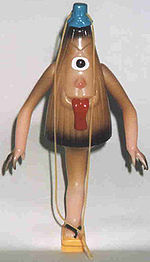
Kasa-obake
Encyclopedia

Tsukumogami
Understood by many Western scholars as a type of Japanese yōkai, the Tsukumogami was a concept popular in Japanese folklore as far back as the tenth century, used in the spread of Shingon Buddhism...
, a folk legend about a form of Japan
Japan
Japan is an island nation in East Asia. Located in the Pacific Ocean, it lies to the east of the Sea of Japan, China, North Korea, South Korea and Russia, stretching from the Sea of Okhotsk in the north to the East China Sea and Taiwan in the south...
ese spirit
Spirit
The English word spirit has many differing meanings and connotations, most of them relating to a non-corporeal substance contrasted with the material body.The spirit of a living thing usually refers to or explains its consciousness.The notions of a person's "spirit" and "soul" often also overlap,...
that originate from objects reaching their 100th year of existence, thus becoming animate. Karakasa in particular are Spirits of Parasols
Oil-paper umbrella
Oil-paper umbrella is a kind of paper umbrella originated in China. It spread across Asia, such as Japan, Korea, Vietnam, Okinawa, Thailand and Laos. People in these countries have further developed the oil paper umbrella with different characteristics...
(umbrellas) that reach the century
Century
A century is one hundred consecutive years. Centuries are numbered ordinally in English and many other languages .-Start and end in the Gregorian Calendar:...
milestone. They are typically portrayed with one eye, a long tongue protruding from an open mouth, and a single foot, generally wearing a geta
Geta (footwear)
Geta are a form of traditional Japanese footwear that resemble both clogs and flip-flops. They are a kind of sandal with an elevated wooden base held onto the foot with a fabric thong to keep the foot well above the ground. They are worn with traditional Japanese clothing such as kimono or yukata,...
.
See also
- ObakeObakeand are a class of yōkai, preternatural creatures in Japanese folklore. Literally, the terms mean a thing that changes, referring to a state of transformation or shapeshifting....
- YōkaiYōkaiare a class of supernatural monsters in Japanese folklore. The word yōkai is made up of the kanji for "otherworldly" and "weird". Yōkai range eclectically from the malevolent to the mischievous, or occasionally bring good fortune to those who encounter them...
- ChōchinobakeChochinobake' are a type of Tsukumogami, a form of Japanese spirit that originate from objects reaching their 100th year of existence, thus becoming animate. Chōchin'obake in particular are created from the chōchin lantern, composed of bamboo and paper or silk...
- TsukumogamiTsukumogamiUnderstood by many Western scholars as a type of Japanese yōkai, the Tsukumogami was a concept popular in Japanese folklore as far back as the tenth century, used in the spread of Shingon Buddhism...
- Inbunche
- MonopodMonopod (creature)Monopods are mythological dwarf-like creatures with a single, large foot extending from one thick leg centered in the middle of their body...

